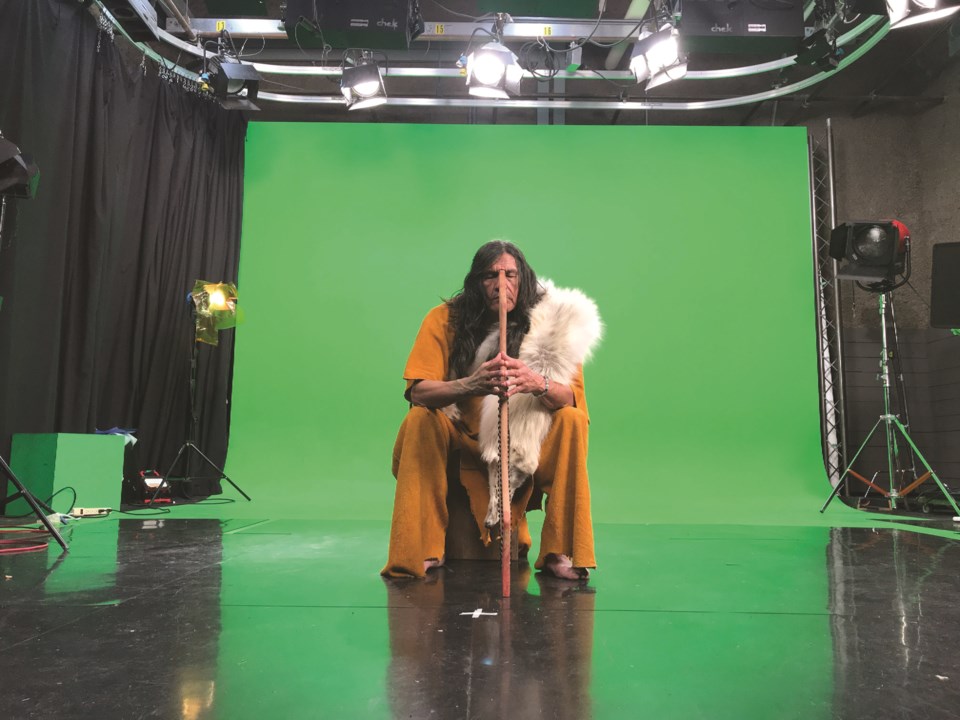They say history is a fable agreed upon, but for the 19th-century Cowichan Chief Tzouhalem, known concurrently as one of the fiercest warriors to ever wage battle in the Pacific Northwest, a brilliant military strategist, a cruel and power-hungry leader, and a supernatural being with powers that defied belief, coming to any kind of consensus on his legacy can feel like a fool’s errand.
It’s that complicated history that Les Bland and Harold Joe set out to untangle in their new documentary, Tzouhalem, which plays the Whistler Film Festival (WFF) on Dec. 2 and 3. Blending talking-head interviews with animated sequences and dramatic re-enactments, it’s the first time Tzouhalem’s story has been put to film, a fact that baffled Bland.
“When you hear about this story, the basic broad strokes, you go, ‘Really? Nobody has ever captured this before?’ And it’s right in our backyard,” he says.
Joe, who serves as co-director with Bland, is a member of the Cowichan tribes and grew up hearing the legends of Tzouhalem, the anglicized version of the name Ts’uwxilum.
“The guy was just an amazing leader,” he says.
“He looked after us. We were well; we were fed. He would send warriors out to help elders, fish, gather, hunt and provide things for the community. He’s been labelled as this tyrant, a real badass guy who hated his own people, which wasn’t true.”
Tzouhalem came of age at a time of great upheaval for the Cowichan, when smallpox left the southern tribes of Vancouver Island vulnerable to raids from other First Nations, and encroaching British colonialists were eager to snatch up Indigenous land.
Tzouhalem’s life was marked by blood and fire almost from its outset. Once, while out picking berries with his grandma as a young boy, Tzouhalem’s village at Kwa’mut’sun was raided by the Haida Nation. Upon their return, they discovered an unspeakable scene mid-raid and hid in some bushes nearby. The young Tzouhalem watched as his baby brother was thrown into churning water, and his mother drowned jumping in after him.
The traumatic experience would set the course for the rest of Tzouhalem’s life.
“As he grows up … he just keeps getting told by his grandma that you have to seek vengeance on this nation when you become older. So he does that,” Joe recounts.
As chief, Tzouhalem established an extensive warrior class and soon the Cowichan become known as fearsome fighters, frequently raiding smaller tribes and nations along the way.
Known for his military mind, Tzouhalem was also “the principle architect and victor of the biggest naval battle that has happened in this part of world,” Bland says—the Battle of Maple Bay, which, sometime around 1840, united different Coast Salish groups together to wage war against the Kwakwaka'wakw Lekwiltok. Some versions of the story even talk about Coast Salish fighters donning women’s clothes to lure the Lekwiltok into the bay, where Tzouhalem had canoes set up to cut off their exit.
“He was this great war chief who achieved all these things,” Bland notes. “It’s almost like a Richard III story when I first heard it.”
But Tzouhalem’s legacy is far from untarnished. Near the end of his life, he was banished by his own community to live out the rest of his days on the mountain that today bears his name after he had taken one too many wives from the warriors he killed in battle that were already promised to someone else.
“He became a renegade over time,” Bland says. “The story of Tzouhalem … shows that First Nations are more than equipped to govern themselves.”
Along with his historically documented feats, Tzouhalem was also known for his spiritual powers. Born with a deformity on his shoulder, Joe says the legends talk of how he was frequently made fun of as a child, and at a memorial for his late mother, the young boy responds to this bullying by pulling burning coals from a roaring fire and eating them. Other stories talk of his ability to shapeshift and turn into smoke, or put dogs to sleep with a glance.
“He had a gift, many gifts. Spiritual gifts, if you will,” says Joe.
This is what makes Tzouhalem’s story so fascinating: he sits at the nexus of fact and fable, an important, flesh-and-blood figure of B.C. First Nations history whose reputation loomed so large it veered into the mythological.
“We were just trying to walk that line, because there are many accounts of Tzouhalem, even within the Cowichan community,” Bland explains.
“We’re asking the question, what version of somebody’s story, especially when you’re hearing the story of a First Nations figure, are we hearing?
“When people see it, I think we’re quite measured in how we manage those threads, themes and ideas. I think we found some nuance in how we tell the story.”
Unlike so many Western accounts of First Nations figures, Joe and Bland’s documentary humanizes Tzouhalem, painting him as the flawed, multifaceted man he was.
“I’m hoping people can watch this and come away with the realization that he was not just a war chief who would kill everything in sight, but there’s a story behind him,” Joe says. “I think Tzouhalem is going to open that up for more of an understanding and a realization of who we are as Cowichan people.”





